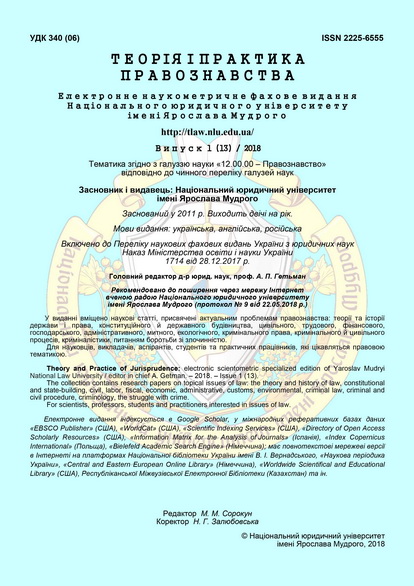The legislative’s inquiry rights ahead of corruption eradication commission performance
DOI:
https://doi.org/10.21564/2225-6555.2018.13.130823Keywords:
Inquiry rights, Legislative Assembly, KPK, Corruption act, E-KTPAbstract
This study proposed to disclose the legislative’s Inquiry Rights ahead of corruption eradication commission (KPK) performance since many officials state are involved in corruption which includes the members of the Legislative Assembly (DPR). The inquiry rights appeal regarding the performance and budget management of KPK apparatus. It is appeal due to electronic identity card (E-KTP) case which involved members of legislative assembly. This study uses nominative approach pointing to the law No. 17/2014 concern with the MPR, DPR, DPRD and DPD and law No. 30/2002 concern with commission eradication сorruption. In addition, it also uses the sociological approach in term of public response to The Legislative Assembly’s inquiry rights appeal. This study revealed that the Inquiry right appealed by Legislative Assembly constitutionally was legal since it was one of the three right of legislative assembly. However, the inquiry right appealed by Legislative assembly regard with Id-card case potentially to hinder the KPK’s performance to prevent any corruption act in Indonesia. Additionally, this appeal also creates pros and cons because the society does not in line with itReferences
Alatas, S.H. (1999). Corruption and Destiny of Asia. Malaysia: Simon and Schuster.
Andi, H. (2011). Eradication of Corruption through National and International Criminal Law. Jakarta: Raja Grafindo Persada.
Bagir, M., (2001). The Development of Thought and Arrangement of Human Rights In Indonesia. Bandung: Publisher PT Alumni.
Creswell, J. (1994). Research Design: Qualitative, Quantitative, and Mixed Methods Approaches.London: Sage Publiation Inc.
Dirgha, I.G.A.N., Wirawan, T., & Purnomo. (1985). Course Matrial of Constitutional Law, Published By : Department of Law of State, Faculty of Law, Universitas Negeri Jember.
Drehel, A and Christos, K. (2004). Corruption around the World: Evidence from a Structural Mode.
Hartanti, E. (2005). Corruption Crime. Jakarta: Sinar Grafika.
Ivon, R.V. Urgency Revocation of Right to Public Occupation for Corruption Actors, Journal of Law Faculty Brawijaya University, Malang.
James M. H. (2010). Sociology: A Down to Earth Approach. Boston: Allyn & Bacon.
Klitgard, R. (1998). Eradicating Corruption. Jakarta: Yayasan Obor Indonesia.
Paiman Napitulu. (2007). Series of Governmental Sciences Towards Representative Government, Bandung: PT Alumni.
Patrick, B et.a. (2004). Understanding Local Level Conflict in Developing Countries: Theory, Evidence and Implication fromIndonesia. Social Development Papers, Paper No.19, Washington DC.
Qamar, N. (2013). Human Rights In Democratic Law Country (Human Rights In Democratische Rechtsstaat). Jakarta: Sinar Grafika.
Rizky, A.I. (2013). Law, Human Rights and Democracy. Yogyakarta: Graha Ilmu.
Robert .K, et al. (2005). Corruption Eradication Guide In Local Government. Jakarta: Yayasan Obor.
Simanjuntak, B. (1981). Introduction to Criminology and Social Pantology. Jakarta: Tarsino.
Soemantri, S. (1993). State Institutions According to the 1945 Constitution. Ed. VII.,Bandung: Citra Aditya Bakti.
Syamsuddin Radjab, DPR Parliamentary Questionnaire Against KPK A Critical Analysis, address: www.hukumonline.Com/berita/baca/lt5948e3, access dated 24 April 2018.
Yusti, P.R., (2005). Behind The Judge’s Ruling: Legal Psychology Study In Criminal Case. Sidoarjo: Dieta Persada.
Wihoho, J., (2006). State institutions after the fourth amendment of the Constitution 1945.Surakarta: UNS Press
http://wikidpr.org/news/kompas-koras-politik-439-koruptor-handled-kpk-76-them-dpr-and-dprd accessed on February 10, 2018.
http://www.indotesis.com/landasan-hukum-and-them-hack-space/#sthash.oj7eUbfF.dpuf, accessed on 12 February 2018.
The 1945 State Constitution of theIndonesiaRepublic(UUD NRI 1945)
Law No. 27 of 2009 on MPR, DPR, DPD and DPRD.
Law No. 17 of 2014 on the MPR, DPR, DPD and DPRD.
Law No. 30 of 2002 on Corruption Eradication Commission.
Law No. 31 Year 1999 on the Eradication of Corruption.
Law No. 20 of 2001 on Amendment of Law No. 31 Year 1999 About the Eradication of Corruption.
Law No. 39 Year 1999 on Human Rights
Downloads
Published
How to Cite
Issue
Section
License
Copyright (c) 2018 Theory and practice of jurisprudence

This work is licensed under a Creative Commons Attribution 4.0 International License.




